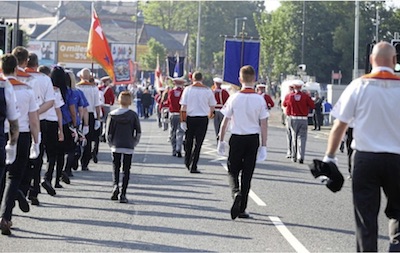
The height of the Protestant marching season passed more quietly than recent years as Orangemen and bandsmen largely respected the rulings of the Parades Commission, which adjudicates on the routes of contentious parades.
The anti-Catholic Orange Order paraded through the nationalist Greater Ardoyne community in North Belfast on Wednesday morning, without protest.
Hundreds of loyalist bandsmen marched noisily past the front of Ardoyne shops followed by Orangemen in collarettes in an early-morning parade, but without a protest by nationalists. The order did not attempt to hold a ‘return’ evening march through the area.
Local priest Fr Gary Donegan, said: “Every step that happens here, no matter how small it is, is massive.”
The parades mark Protestant King William of Orange’s victory over the Catholic James II at the Battle of the Boyne in Ireland in 1690.
Orange bands also passed St Patrick’s Church on Donegall St without incident. The church had become a flashpoint in the marching dispute after a loyalist band from Belfast’s Shankill area was filmed playing a sectarian tune while wheeling around the front of the chapel in 2013.
The same tune, known as ‘the Famine Song’, caused controversy when it was played at an Orange Order parade in Glasgow, Scotland, last week.
A subsequent threat by Glasgow City Council to ban all parades by the order in the city may have had a knock-on effect in the North of Ireland, as only in east Belfast was the tune heard as bandsmen approached the nationalist Short Strand.
However, ‘The Sash’ was also sung as members of one band drummed near Ardoyne, close to the junction of Crumlin Road and Woodvale Road.
The spokesperson for Greater Ardoyne Residents Collective, Dee Fennell, criticised the singing of ‘The Sash’ and said it may hold protests in future.
“We took a responsible decision in the interests of reducing the impact on local residents who are already facing a security operation,” he said.
“We could protest at the next event in August.”
Sinn Fein’s Gerry Kelly claimed the atmosphere was “entirely different”.
“There was a much more relaxed atmosphere. You can come here this morning with some relief and some knowledge that it is going to be passed over in a very short period of time and relationships can be built upon that,” he said.
![[Irish Republican News]](https://republican-news.org/graphics/title_gifs/rn.gif)
![[Irish Republican News]](https://republican-news.org/graphics/title_gifs/harp.gif)

